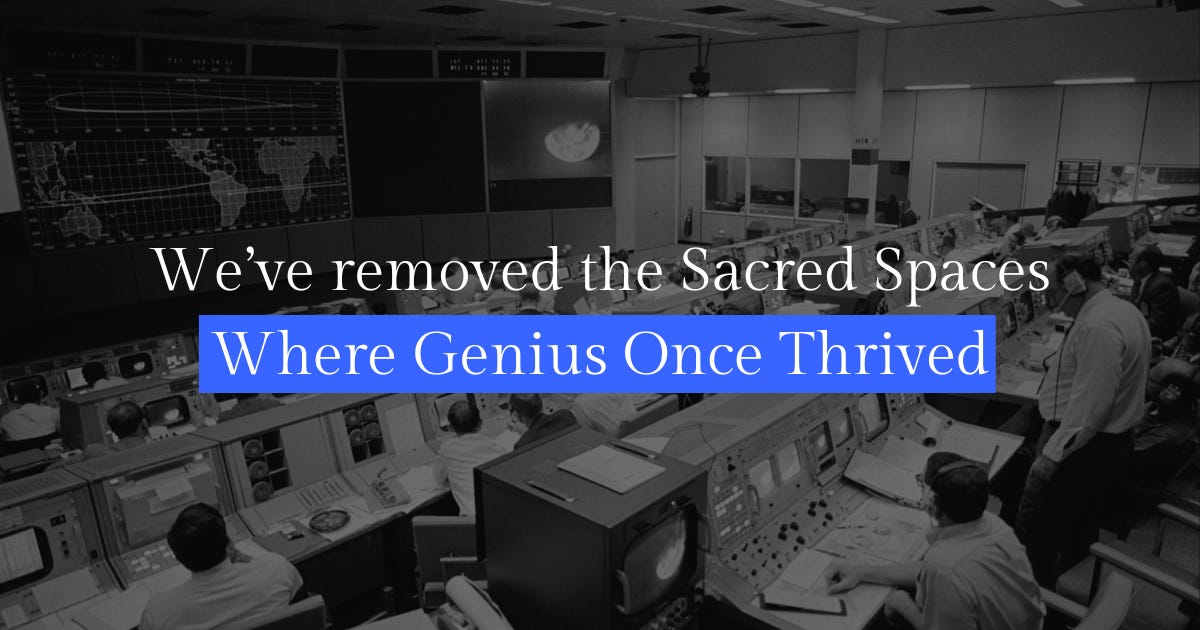My notification went off.
A message from a coworker: idea was shot down.
I messaged back: That’s the third time, right??
Message bubbles floated. 20+ yrs of experience was about to pour in a long, dense message. He'd seen promising innovations wither under corporate pragmatism.
He replied: Do you know how many ideas have been shot down because they weren’t earning fast enough for the quarterly numbers? Anything without guaranteed immediate return is foreign."
The conversation shifted to other innovations we'd witnessed die premature deaths—brilliant solutions to problems organizations weren't ready to admit.
Then I asked a question:
“If we had the Space race today’s time, no Cold War, would we make it to the moon?”
The statement hung for minutes until I get a notification.
“No”, he said.
"What do you mean?"
"The way we structure projects now... the way we grade ideas on immediate ROI instead of future potential... Apollo would never get funding."
His words crystalized something I'd felt but couldn't articulate: We've built a system that systematically filters out the very thinking patterns that lead to breakthrough innovation.
We say we want innovation yet; we cower when it’s time to do the work.
The Moonshot Mindset:
In his book Moonshot, psychologist Richard Wiseman studied the Apollo program to understand what made this impossible achievement possible. Beyond the technical brilliance, he found a psychological architecture—a protected space where different rules applied.
The Apollo program operated with:
Mission over metrics: The goal transcended quarterly returns
Problems over processes: Engineers had autonomy to solve challenges their way
Curiosity over credentials: NASA recruited diverse thinkers, not just aerospace specialists
Learning over liability: Failures were treated as necessary discoveries
In 1961, Kennedy didn't present Congress with a detailed ROI analysis for the Apollo program.
He didn't have quarterly OKRs for moon landing progress.
He simply declared: "We choose to go to the Moon."
That declaration created what Wiseman calls "moonshot thinking"—a mindset where audacious goals are systematically broken down while maintaining the emotional resonance of the impossible mission.
The Sacred Space Collapse
Apollo engineers weren't punished for exploring seemingly impractical ideas. They weren't asked to justify every experiment with immediate applications. They were given the most precious resource in innovation: the freedom to be wrong repeatedly before being right once.
Mainly it was pushed forward by war.
The Cold War—for all its dangers—created conditions where frontier-pushing innovation became an existential priority. The "sacred space" for genius wasn't nice to have; it was necessary to survive.
But this freedom wasn't chaotic—it was contained within the structures of possibility, not probability. As Wiseman points out, the Apollo program balanced visionary thinking with rigorous execution, fueled by what he identifies as a powerful psychological motivator: meaningful purpose that transcended individual ambition.
Today, that space has collapsed.
My coworker's rejected idea reminded me that innovation doesn't just happen.
It requires conditions—conditions we've systematically eliminated from modern work.
We've replaced mission-driven teams with process-driven organizations.
We've replaced experimental thinking with risk management.
We've replaced breakthrough goals with incremental targets.
We've replaced learning failures with efficiency mandates.
Allergic to any amount of red on our balance sheets.
Even worse, we've convinced ourselves this is progress—that our innovation processes are more "mature," more "disciplined," more "efficient" than the chaotic creativity of earlier eras.
But what if our mature processes are actually filtering out genius?
What if our risk management frameworks are managing away the very conditions that breakthrough thinking requires?
Creating Your Own Apollo Program
Last week, I watched my coworker circumvent the system.
Instead of going the traditional route of contacting higherups, he found people who believed in his idea and started building a prototype after hours. They created their own sacred space—a protected realm where different rules applied.
Wiseman would recognize this behavior. The Apollo teams developed what he calls "psychological immunity" to setbacks—not by ignoring reality, but by remaining committed to the larger purpose.
My coworker wasn't just being stubborn; he was practicing moonshot thinking on a smaller scale.
It reminded me that innovation isn't just about having good ideas—it's about creating conditions where the right kinds of thinking can flourish. It's about building sacred spaces that protect genius from the immune system of pragmatism.
The Practical Wonder
We may not have a Cold War driving us to the stars anymore. But we still need spaces where people can reach for impossible things—where they can be obsessive, nonlinear, and free to fail in service of something magnificent.
Every organization needs its own Apollo program—not as a project, but as a protected realm where different rules apply and different thinking patterns are valued.
Because one day, we may need to reach the Moon again.
And when that day comes, I hope we still know how.





More than every organization - every person needs this space.
Love the example and great writing Mohammad